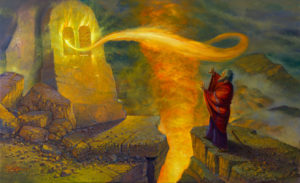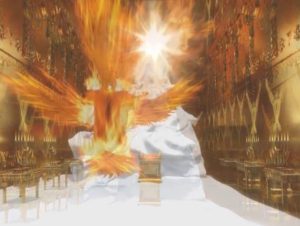Commandments as Guidelines and Revealers of Sin:
Paul Wrote Commandments Reveal One’s Sin?!
For years I struggled to understand Paul’s statement, “Yet if it had not been for the law, I would not have known sin” (Ro 7:7). The first question that comes to mind has already been asked by Paul, “What then shall we say? That the law is sin?” He answers emphatically, “By no means!” However, Paul goes on to write that it was the giving of the command(s) that unmasked sin to bring death (Ro 7:8-9). But most confusing of all was Christ’s Sermon on the Mount explanation of several commandments appearing to negate the Law (Mt 5:17-30). One is left with the confusing choice that God lied in the Old Testament or is lying in the New Testament; and some agree that the entire Bible is a lie! Certainly, when approached from man’s perspective the Bible is very confusing because it was written from God’s perspective and can only be taught by God (1Co 2:12-14). Let us begin from Captain Barbossa’s perspective, that the commandments {code} is more like guidelines than rules” {Pirates of the Caribbean. (Watch above clip)}.
How did Paul arrive at his conclusion that commandments reveal sin other than by direct revelation? This is important for each believer begins as an immature babe in Christ (1Co 3:1-2). One is expected to grow in grace, maturing in understanding the mind of Christ through biblical study and life experience (He 5:11-14; 1Pe 2:2). Now, let us take this as a pattern for biblical human history. Genesis reveals God exists, God is Creator and God created Man. Man rebelled (sin) (Ge 3:1-11). Death entered. Genesis then sets the stage for the coming Messiah who would destroy sin while being wounded himself (Ge 3:15).
Notice the pattern Paul discussed; God gave the commandment, “…of the tree of the knowledge of good and evil you shall not eat, for in the day that you eat of it you shall surely die” (Ge 2:16-17). Sin awoke in Man but had to be coaxed in Woman (1Ti 2:14). God made Man in the Flesh, though sinless; yet, it was the Flesh reacting against the limitation of the commandment that rebelled under the tutelage of Satan, the Master Sinner (Jn 8:44). Man willfully traded being a child of God for being a child of Sin and Death to gain independence from God while becoming a slave to sin (Ro 6:15-16).
Lost Man will argue that God caused sin by giving the commandment, “Do not eat…”! Indeed, Paul agrees that giving the commandment awoken sin in the Flesh. What is missed is that the Flesh was already prone to sin, though it had not yet sinned (1Co 1:29). Again, did God author sin by making Man in the Flesh? No! Man, not yet enslaved to sin, was given the Choice: obey God or rebel against God. God did not interfere in Man’s Choice to preclude the charge that God either caused Man’s sin or protected Man from sin (Job 1:9-10; 2:4-5). Did the commandment cause the sin? No, Man Chose to sin from his own nature. Man could have appealed to God for help in resisting Sin and Satan; Man Chose not to pray and sinned. A pattern repeated by Cain even after God plainly told him his options; Cain Chose to murder rather than ask God for strength to resist sin (Ge 4:6-8). Man was impotent to Control sin; especially since each person born was already enslaved to sin (Ps 51:5). Each commandment only unmasked the sin now already present. However, only vital element is absent from Genesis but is revealed in Exodus: Holiness.

Running Theme of the Old Testament:
Dichotomy of God’s Holiness vs Man’s Sin
Most basic understanding of holiness: It is what God is and what Man is not (Ja 1:13-17). But, Man needs practical guidance defining the difference. God appears to Moses as a burning tree symbolizing His holiness and the mechanism by which it will be judicially satisfied; death on a tree. Holiness and its judicial satisfaction is the underlying theme of the Old Testament. Every book highlights Man’s sinfulness, Man’s inability to assuage or satisfy the judicial sentence of death for violating God’s holiness and God’s plan to provide Himself as the sacrifice for Sin on the Stauros (Ge 22:7-14). God then leads His new people, the Hebrews developed in Genesis, and rescued from Egypt in Exodus, into the Wilderness to give them the Moral Law; i.e., the Ten Words {Commandments} (Ex 20:1-17).

Man’s Imagination of Holy God Giving
Ten Words: Essence of His Holiness
The Ten Words are the distilled essence of God’s nature; i.e., His holiness. Man’s sinfulness revealed by each violation of each Word. These words were never designed to erase sin! They were given to reveal one’s sinfulness! Coupled with one’s inner guilt, gift of God, they were to drive Man to God in humility and salvation from the Law’s Death sentence! Man and Woman found grace when they humbled themselves to God and received the promise of a coming Messiah. Abraham found grace in faith by humbling himself before God before receiving the sign of circumcision which represented the negation of the Flesh as a sacrifice for sin (Ge 17:10-14; Ro 4:9-13). Paul clearly acknowledges that the Law only brings a Death sentence; it cannot bring Life.
Christ Sitting on Throne of Holiness
Underlies Entire Old Testament
Think of the Old Testament as a parenting book. Man begins with an infantile grasp of God and sin. The Ten Words are given to slowly educate Man on: 1) God’s Holiness and 2) Man’s Sinfulness and Hopelessness under the Law. Beginning with Isaiah and continuing through Daniel and Ezekiel, God pulls back the curtain of reality showing what had always existed: Holy Christ sitting on His heavenly Throne (Is 6:1-7; Da 7:9-10; Jn 1:1-18; Col 1:15-17). Man is ineligible to satisfy the violation of God’s holiness because of his inherent sin; he begins in sin, remains in sin and dies in sin. Yet, there is hope as Isaiah is redeemed, David is redeemed despite being a murderer and thousands more in the Old Testament (He 11:32-40).
Christ comes as the Messiah and His first message through Matthew? The Law will never be annulled! The Jews had spent nearly 1400 years trying to turn the Moral Law into life by keeping its provisions as simplistic rules. Christ tells them they failed! He demonstrates that these rules, were not given to be rigidly kept but to demonstrate the impossibility of sinners to follow these rules. Breaking the least of these rules, even once, invoked the irreversible death sentence (Ja 2:-12). Christ also informed them that these rules were guidelines. Each commandment was simply a starting point for meditation. As one began to understand, mature in one’s thinking, the focus of each major point, it would lead to greater understanding of all the complexities that involved all human behavior. In other words, even if one never murdered, one was guilty of the anger that ran throughout all human behavior and was guilty of breaking the Law.
The Lost or False Jews assertion that they could obtain holiness from unholiness through keeping the Law they had already and repeatedly violated was a sham, a means of pretending to be righteous without humbling oneself to God; much like Cain. They sought to use the Law as a shield against God even though it condemned them. They hated Jesus for revealing this to them and, like Cain, they murdered Him rather than seek forgiveness from God. This very action provided God Himself as the sacrifice satisfying God’s holiness and assuring their eternal judgment (2Co 5:21). We know this to be true because the New Testament description of Christ’s Throne is completely different after He presented Himself after His death and resurrection on the stauros (Jn 20:11-18).

Fire Depicting Christ’s Holiness Gone;
Satisfied by His Own Blood; We Have Peace Now
Christians are not under the Law for it was satisfied in Christ; hence, it does not condemn us. Neither has it be absolved for it remains forever a picture of God’s immutable character and our guide by which we measure our maturation in Christ. We can approach Him on His Throne because we are now clothed in His righteousness (Col 3:1-11; He 4:15-16). We do not keep the Law to obtain righteousness which is impossible. We begin to live the Moral Law from the essence of our New Nature which is in the likeness of Christ (2Co 5:17; Ga 2:20).
Yes, it shows us our sin (1Jo 1:8-10). We confess our sin and He forgives us; something sinners cannot and will not do from Adam to Cain to Job to you and to me (Ro 1:18-32). In the coming New Jerusalem, which Abraham looked forward to seeing, we shall behold His throne and give praises to Him for saving us though we were unrepentant sinners hostile to Him (Ro 5:6-11; Re 21:1-8). Those who seek to live by their works will be condemned by those same works and find they have judged themselves to the eternal search for any speck of righteousness (Re 20:11-15).
Captain Barbossa, as everyone in the movie, Pirates of the Caribbean, used their logic to excuse their lies, greed and despicable sinfulness. All were guilty of betrayal for self-gain; welcome to sin. The movie, as propaganda, excused their sinfulness seeking to self-justify their sin for the achieving a greater good. The Ten Words and one’s guilty conscience reject this deceitfulness which only hardens your heart against Christ’s salvation. But, there is always hope in Christ…
These Ten Words, under the tutelage of the Holy Spirit, have guided us into salvation. The pretense of rigidly keeping these rules only proved our sinfulness. The understanding and exploration of these commandments as guidelines showed us the total depravity of our flesh and the need for the Savior the Father provided in Christ that we may be clothed in His holiness and not be ashamed when presented to the Father (Jude 20-24). Thus, like everyone before us, the only Choice is: 1) Continue in sin with the pretense of gaining self-righteousness or 2) repenting, admitting my sin, and confessing that I need God’s Christ (Ro 10:8-13). Will you be saved today?
